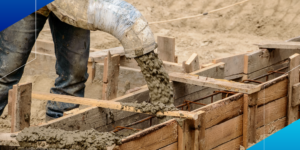
Contractors in Florida are experiencing delays and cancellations with concrete pours, according to a recent post on Reddit which has so far attracted 47 discussion comments. While it’s likely that various factors are contributing to the slowdown, anecdotal reports suggest Amazon and other large companies may be partially to blame.

The Reddit post describes a recent situation in which a small 15-yard concrete pour — scheduled weeks in advance — was canceled last minute by a large concrete company (allegedly Cemex, though this is not confirmed).
The company claimed to have not had any material available for the pour. However, after contacting a local pump operator, the Reddit poster learned that a local Amazon warehouse was being built and was allegedly “sucking up all the concrete in Florida.”
Other users claimed to have heard similar stories elsewhere in the country — Amazon warehouses are supposedly “popping up like daisies” and forcing concrete suppliers to push scheduled pours out by weeks if not canceling them altogether.
As it turns out, Amazon is indeed rapidly expanding across the US and globally. The pandemic resulted in a boom for e-commerce businesses, and Amazon saw period-on-period profit increases as high as 220% during some months.
In order to keep up with demand, Amazon and many other companies have been buying up space to build new warehouses and distribution hubs. These expansions create jobs for local communities, but they also use an enormous amount of construction resources.
One Reddit user claimed to have recently managed a one million square foot Amazon fulfillment center in the midwest. By the time all concrete work had been completed, teams had poured “just shy of 72,000 yards” of concrete sourced from three separate batch plants.
The user expressed that although this was indeed a lot of concrete, a single Amazon warehouse would probably not demand enough to result in state-wide shortages. But what if it was more than just one Amazon warehouse being built?
Consumers have come to expect shorter and shorter delivery times. In some areas of the country, Amazon’s response is to ensure every community is within a 45-minute drive of a distribution center. If this is applied to the rest of the country, it’s likely Amazon’s expansion won’t slow down any time soon.
In Southern California, Amazon tripled the number of its distribution hubs in 2020 to 32, adding warehouses ranging in size from 18,000 to 620,000 square feet. In San Antonio, Amazon recently planned to open a 750,000 square foot robotics fulfillment center.
Levelset sourced data on 62 separate Amazon projects in the last year across the US, with states such as California, Arizona, Nevada and Texas experiencing some of the largest growth.
This is far from an exhaustive catalog: Levelset’s payment profile for Amazon lists more than 3,700 separate projects in the last 12 months.
If multiple warehouses, consuming tens if not hundreds of thousands of yards of concrete, were to suddenly spring up in a community, it certainly seems plausible that concrete suppliers might struggle to keep up with demand.
And that’s just Amazon — e-commerce sales have generally exploded across the board, resulting in many other large online retailers buying up physical real estate to build new warehouses and distribution centers.
Levelset contacted multiple Reddit users that experienced difficulties sourcing concrete from large suppliers. Many were given a similar story, which is: Regardless of whether there is a true concrete shortage, suppliers are simply prioritizing pours at large warehouses for big companies such as Amazon.
The original poster of the Reddit thread even claims to have been told that, allegedly, Amazon has negotiated a deal with Cemex to get first access to concrete for their projects.
Whatever the true answer is for the Florida concrete dilemma, there’s no doubt the expansion of major retailers such as Amazon continues a trend of increased demand in a supply-restricted environment.
Supply chain issues still hamper our economy, but consumer and commercial demand is rapidly catching up and even exceeding pre-pandemic levels. For construction professionals, this means higher prices, labor shortages, and other challenges.
For contractors, this is certainly a trend to be aware of. The expansion of major online retailers could mean that concrete pour delays and cancellations will become more common in your community, and it’s important to factor this risk into project plans and budgets.